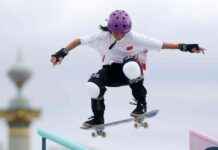Tracing the Roots through Trains: A Family History of Ideals and Tragedy
In the bustling era of the late 1910s and early 1920s, China was a cauldron of political fervor and ideological exploration. Amidst the chaos, the story of a Chinese family unfolds, intertwined with the nation’s tumultuous history.
The Paris Musketeers: An Idealistic Movement
Li Shizeng, a scion of a high mandarin family, embarked on a journey to France with his friend Zhang Jingjiang, seeking knowledge and enlightenment. Li’s eccentric idealism led him to establish a revolutionary bean-curd factory, blending cutting-edge technology with social consciousness. His experiments in soy products aimed to alleviate famine and promote public health, embodying the anarchist philosophy of mutual aid.
A Journey to France: Communist Influences
As the Work Study Movement gained momentum, future communist leaders like Mao Zedong, Zhou Enlai, and Deng Xiaoping ventured to France. Amidst struggles with financial constraints and cultural shock, disillusionment with Western capitalism grew. Chen Yi’s experience at a French factory exposed the harsh realities of industrial life, fueling his radicalization towards communism.
From Ideals to Realities: The CCP’s Rise and Fall
The Work Study Movement’s transition from anarchist ideals to communist fervor mirrored China’s political landscape. Cai Hesen’s conversion to communism catalyzed the formation of the CCP, leading to radical actions like the Lyon University occupation. As the movement fizzled out and communist influence grew, the clash between the KMT and CCP reshaped China’s destiny.
The Tragic End: A Family’s Loss
In the midst of societal upheaval, the Chinese family’s journey took a tragic turn. The pressures of a new communist society and personal struggles culminated in a heartbreaking loss. As the family grappled with grief and adjustment, the story of resilience and survival in a changing China unfolds, marked by sacrifice, tragedy, and the enduring spirit of the human experience.









![Indie music fans gather at l’Antipode for [Face B] Kool Things soirée on Saturday night news-15112024-105933](https://shanghainewstv.com/wp-content/uploads/2024/11/news-15112024-105933-218x150.jpg)







